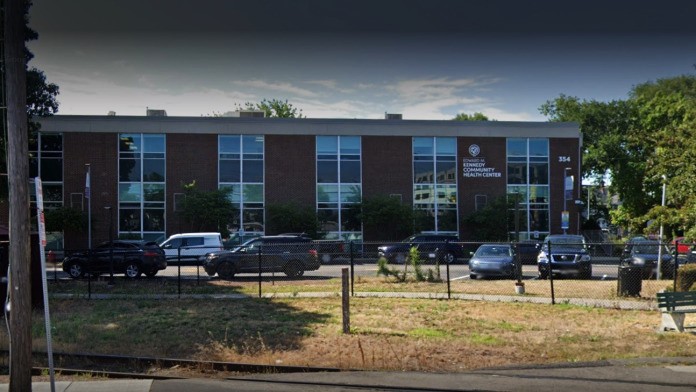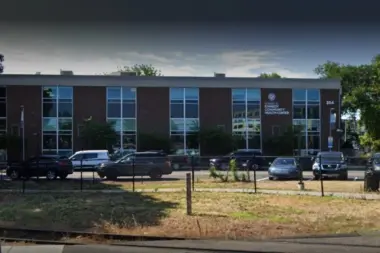About Advocates Community Counseling
Advocates Community Behavioral Health Center in Framingham, Massachusetts provides compassionate and culturally competent care for individuals with substance use disorders and mental health issues. They can take care of co-occurring disorders as well. They can deliver both routine counseling and emergency room services. They offer same-day help for urgent behavioral conditions and 24/7 crisis intervention.
Services are available in all languages, including American Sign Language, to ensure people from diverse language backgrounds can get the support they need. They accept MassHealth, Medicare and most private insurance plans to keep costs low and services accessible to broader audiences.
Accessing Treatment in Framingham
Community Behavioral Health Center (CBHC) is situated along Worcester Road in the southern section of Framingham within Middlesex County, Massachusetts. The facility is just two miles south of the Framingham State Park and six miles northeast of Sudbury Reservoir. They extend services to patients from neighboring Natick, Waltham and Boston. Framingham bus terminal is a mile west of the facility and provides connection to local and regional bus routes. Framingham MBTA Station provides commuter rail service to Boston.
Crisis Support for Substance Use Disorder
Advocates offers 24/7 support for adults and adolescents experiencing acute mental health and substance use disorder crises. Their sensitive, respectful and tailored support at such critical periods fosters stability among patients. The coolest part is that this service can be delivered at home, school and many other community settings. So you don’t even have to make unnecessary emergency room visits.
Their community crisis stabilization (CCS) delivers more structured community-focused care for adults in crisis. This short-term program offers a voluntary and less restrictive overnight alternative to inpatient psychiatric care. The goal is to help you stabilize in a nurturing and supportive environment before connecting you to the appropriate care options for continued recovery. Transportation assistance is provided for this program.
Medication-Supported Recovery for Opioid Dependency
They offer medication assisted treatment (MAT) as a core recovery option particularly for adults dealing with opioid use issues. They may offer either buprenorphine or naltrexone to help you curb physiological cravings and eliminate painful withdrawal symptoms. The technique also includes counseling to help you tackle psychological and emotional issues and build coping skills to prevent relapse.
They offer individual, family and couples counseling that draws from proven methods like cognitive behavioral therapy. This helps you manage symptoms, improve relationships and develop healthier coping strategies. They also offer therapy groups where you can practice new sober skills like healthy communication, problem solving and anger management. Integrating behavioral therapy and addiction meds has been proven to foster lasting abstinence.
The facility also provides psychiatric assessments and medication management as part of comprehensive care. This can particularly benefit patients with co-occurring disorders.
Recovery Coaching and Care Coordination
They also offer recovery coaching with certified coaches available to help you navigate recovery and live a fulfilling life. Certified recovery coaches are trained professionals who use their personal experiences with addiction to guide and support others in their recovery journey. These experts provide non-clinic support like helping you with goal setting, exploring community resources and providing emotional encouragement during challenging times.
The wraparound services in this clinic may include recovery support services via care coordination as you move forward. These may include help with securing affordable housing, job search or placement, transportation and nutritional support.
Latest Reviews
-Danielle Dunn Flaven, Vice President of Integrated Clinical Services
Rehab Score
Gallery


Accepted Insurance
Other Forms of Payment
Medicaid is a state based program that helps lower-income individuals and families pay for healthcare. Medicaid covers addiction treatment so those enrolled can use their coverage to pay for rehab. When a program accepts Medicaid the client often pays very little or nothing out of their own pocket.
Private insurance refers to any kind of healthcare coverage that isn't from the state or federal government. This includes individual and family plans offered by an employer or purchased from the Insurance Marketplace. Every plan will have different requirements and out of pocket costs so be sure to get the full details before you start treatment.
Self-pay involves paying for treatment out of your own pocket. You can use savings or credit, get a personal loan, or receive help from family and friends to fund your treatment. If you don't have insurance or your insurance plan doesn't cover a specific program, self-pay can help ensure you still get the care you need.
Financial aid can take many forms. Centers may have grants or scholarships available to clients who meet eligibility requirements. Programs that receive SAMHSA grants may have financial aid available for those who need treatment as well. Grants and scholarships can help you pai for treatment without having to repay.
Sliding scale payments are based on a client's income and family size. The goal is to make treatment affordable to everyone. By taking these factors into account, addiction recovery care providers help ensure that your treatment does not become a financial burden to you or your family, eliminating one barrier to care.
Medicare is a federal program that provides health insurance for those 65 and older. It also serves people under 65 with chronic and disabling health challenges. To use Medicare for addiction treatment you need to find a program that accepts Medicare and is in network with your plan. Out of pocket costs and preauthorization requirements vary, so always check with your provider.
Addiction Treatments
Levels of Care
Outpatient Programs (OP) are for those seeking mental rehab or drug rehab, but who also stay at home every night. The main difference between outpatient treatment (OP) and intensive outpatient treatment (IOP) lies in the amount of hours the patient spends at the facility. Most of the time an outpatient program is designed for someone who has completed an inpatient stay and is looking to continue their growth in recovery. Outpatient is not meant to be the starting point, it is commonly referred to as aftercare.
Treatments
Many of those suffering from addiction also suffer from mental or emotional illnesses like schizophrenia, bipolar disorder, depression, or anxiety disorders. Rehab and other substance abuse facilities treating those with a dual diagnosis or co-occurring disorder administer psychiatric treatment to address the person's mental health issue in addition to drug and alcohol rehabilitation.
Mental health rehabs focus on helping individuals recover from mental illnesses like bipolar disorder, clinical depression, anxiety disorders, schizophrenia, and more. Mental health professionals at these facilities are trained to understand and treat mental health issues, both in individual and group settings.
Programs
Adult rehab programs include therapies tailored to each client's specific needs, goals, and recovery progress. They are tailored to the specific challenges adult clients may face, including family and work pressures and commitments. From inpatient and residential treatment to various levels of outpatient services, there are many options available. Some facilities also help adults work through co-occurring conditions, like anxiety, that can accompany addiction.
Recovery is most successful when clients feel accepted and validated by their peers and treatment providers. Facilities that offer LGBTQ-inclusive programming are committed to creating a safe space where everyone can grow and recover without fear of judgment or discrimination. They will have dedicated policies in place to create a safe and supportive environment that fosters free expression.
Young adulthood can be an exciting, yet difficult, time of transition. Individuals in their late teens to mid-20s face unique stressors related to school, jobs, families, and social circles, which can lead to a rise in substance use. Rehab centers with dedicated young adult programs will include activities and amenities that cater to this age group, with an emphasis on specialized counseling, peer socialization, and ongoing aftercare.
Clinical Services
Cognitive Behavioral Therapy (CBT) is a therapy modality that focuses on the relationship between one's thoughts, feelings, and behaviors. It is used to establish and allow for healthy responses to thoughts and feelings (instead of unhealthy responses, like using drugs or alcohol). CBT has been proven effective for recovering addicts of all kinds, and is used to strengthen a patient's own self-awareness and ability to self-regulate. CBT allows individuals to monitor their own emotional state, become more adept at communicating with others, and manage stress without needing to engage in substance abuse.
Whether a marriage or other committed relationship, an intimate partnership is one of the most important aspects of a person's life. Drug and alcohol addiction affects both members of a couple in deep and meaningful ways, as does rehab and recovery. Couples therapy and other couples-focused treatment programs are significant parts of exploring triggers of addiction, as well as learning how to build healthy patterns to support ongoing sobriety.
Research clearly demonstrates that recovery is far more successful and sustainable when loved ones like family members participate in rehab and substance abuse treatment. Genetic factors may be at play when it comes to drug and alcohol addiction, as well as mental health issues. Family dynamics often play a critical role in addiction triggers, and if properly educated, family members can be a strong source of support when it comes to rehabilitation.
Group therapy is any therapeutic work that happens in a group (not one-on-one). There are a number of different group therapy modalities, including support groups, experiential therapy, psycho-education, and more. Group therapy involves treatment as well as processing interaction between group members.
In individual therapy, a patient meets one-on-one with a trained psychologist or counselor. Therapy is a pivotal part of effective substance abuse treatment, as it often covers root causes of addiction, including challenges faced by the patient in their social, family, and work/school life.
Trauma therapy addresses traumatic incidents from a client's past that are likely affecting their present-day experience. Trauma is often one of the primary triggers and potential causes of addiction, and can stem from child sexual abuse, domestic violence, having a parent with a mental illness, losing one or both parents at a young age, teenage or adult sexual assault, or any number of other factors. The purpose of trauma therapy is to allow a patient to process trauma and move through and past it, with the help of trained and compassionate mental health professionals.
Staff
Diane Gould, LICSW
President & CEO
Regina Marshall
COO
Keith Neal, MBA, MHL, CHFP
CFO
Dr. Madeline Aviles-Hernandez
Senior VP of Behavioral Health Services
Jeffrey Keilson
Senior VP of Strategic Planning
Janine Taylor, MS, SPHR, SHRM-SCP
Chief Human Resources Officer
Mark Viron, MD
Chief Medical Officer
Joseph Robitaille, MBA, LABA, BCBA
Senior VP of Children’s Services
Contact Information
354 Waverly Street
Framingham, MA 01702




